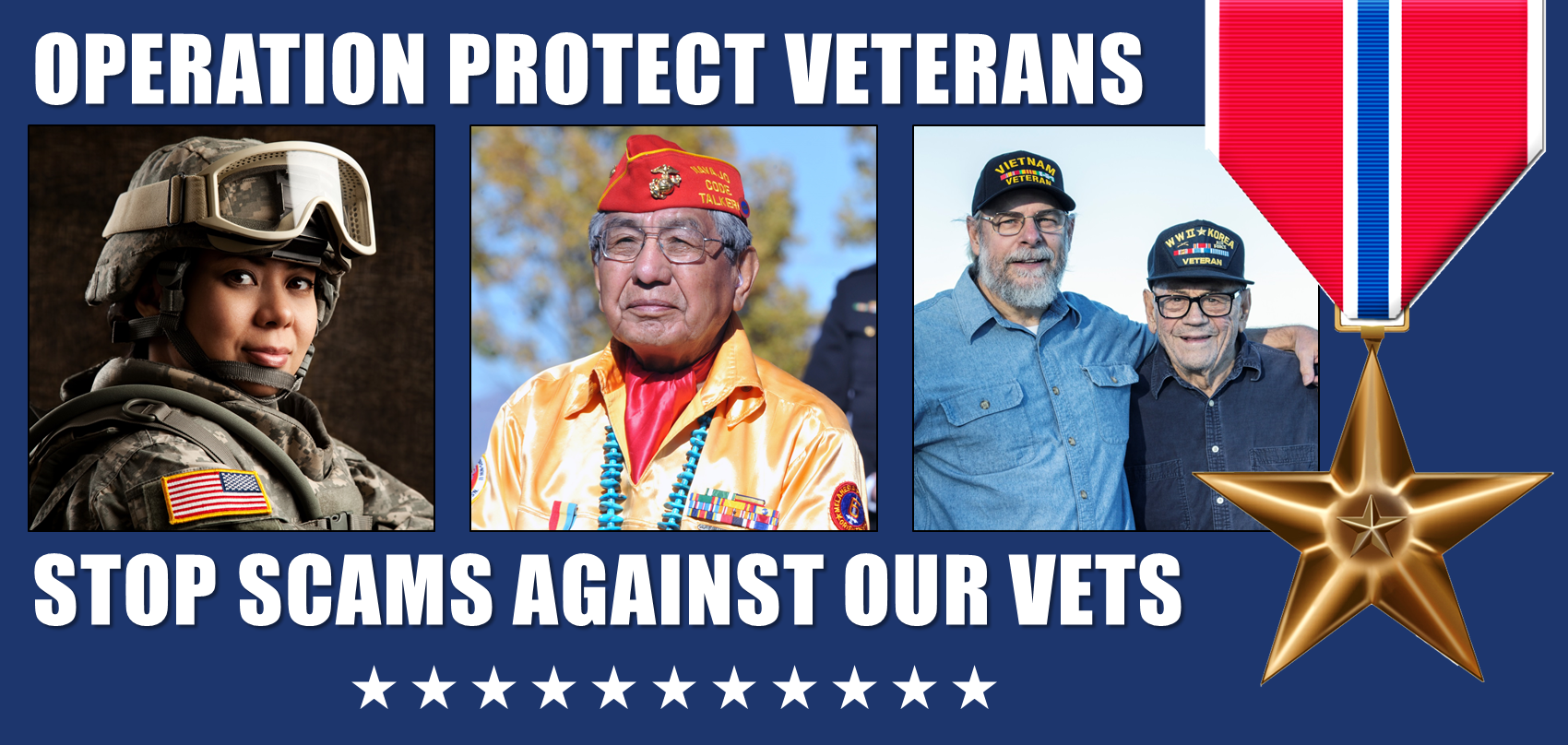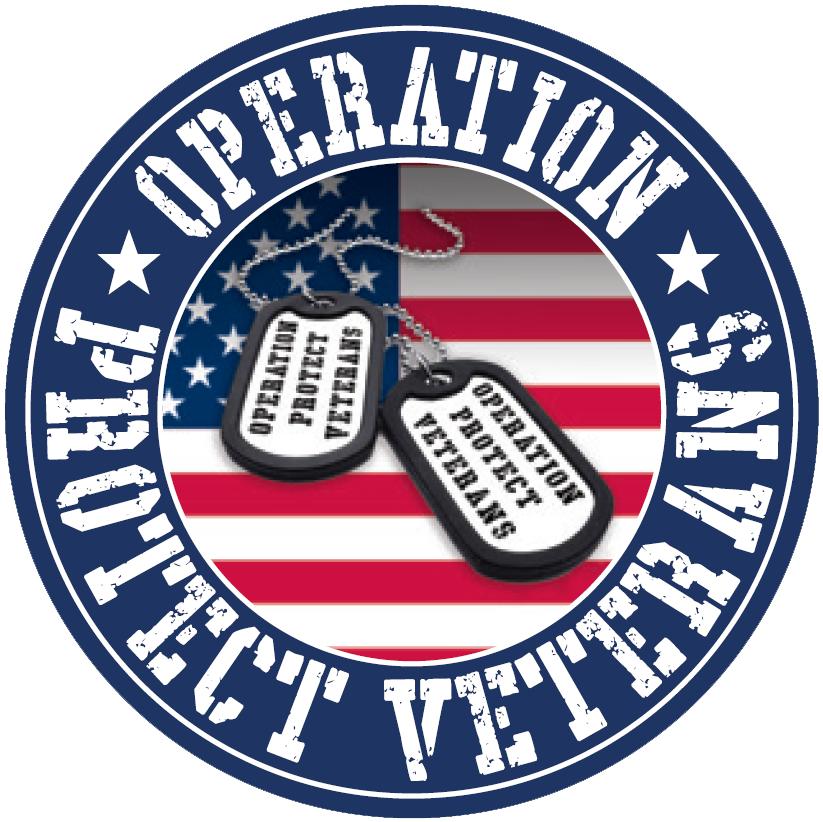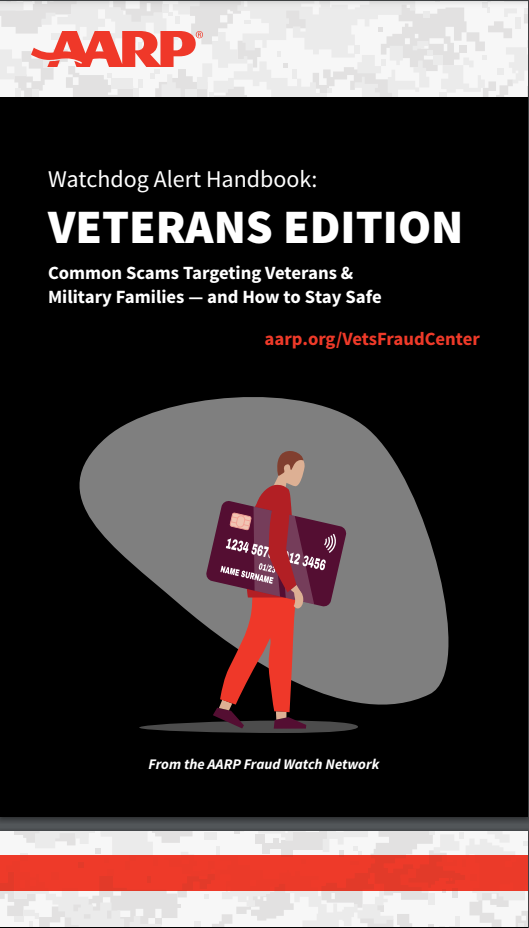AARP Hearing Center

Research Finds Military Veterans are Victimized by Scams Twice as Often as Nonveterans
According to an AARP survey, one in three military/veteran adults reported losing money to scams that are specifically trying to take advantage of the trust they have in the military community. Veterans, active-duty service members and their families are 40% more likely to lose money to scams and fraud than the civilian population. These individuals lost more than $267 million in 2021, up from $102 million in 2020 (a 162% increase), according to the Federal Trade Commission.
Montana’s 94,404 military veterans and active-duty service members are at risk of being targeted by scammers. As a result of this threat, AARP launched the AARP Veterans Fraud Center, a new online education and resource center to help protect veterans, service members and their families against fraud.
- AARP Veterans Fraud Center, a new online education and resource center to help protect veterans, service members and their families against fraud

Fraudsters come at ex-service members from many angles, employing vet-focused twists on identity theft, phishing, impostor scams, coronavirus scams, and investment and loan deceptions. The goal is often to manipulate or gain access to benefits the government provides to those who served. For example:
- Veterans are told they qualify for money from “secret” government programs but must first pay a fee or provide personal information.
- Scammers exploit veterans in financial duress by offering cash upfront in exchange for (much higher) future disability or pension payments.
- Con artists attempt to charge veterans for access to their service records or for government forms. Veterans can get this material for free from the Department of Veterans Affairs (VA) or the National Archives.
Other scams are examples of “affinity fraud,” in which crooks pose as veterans, or representatives of organizations that support them, to gain access and trust. For example:
- Bogus military charities hit up former service members for donations.
- Phishers impersonating VA officials ask for personal information such as Social Security numbers, saying they need to update the veteran’s records.
- Crooks pretending to be from Tricare, the health care program for military personnel and retirees and their families, contact beneficiaries offering them COVID-19 test kits. It's another ploy to steal personal or financial data.
- Fake classified ads for rental properties offer discounts for veterans and active-duty military. Targets are instructed to wire money for a security deposit for what turns out to be a nonexistent property.
- Scammers, sometimes posing as soon-to-be-deployed service members, offer special deals for veterans on cars, electronics and other products, again asking for payment by wire. Once you’ve paid, the seller disappears and the goods never arrive.
Other deceptions target veterans seeking jobs, health care or higher education. You can learn more in the veterans’ edition of the AARP Watchdog Alert Handbook.
Here are more details about some of the most common scams targeting veterans:
Benefit Schemes:
There are dishonest advisers who promise veterans that they can get additional VA benefits if they invest in certain products, or offer cash now if the veteran turns over future benefits. The Federal Trade Commission (FTC) states that some financial planners and insurance agents try to convince veterans to buy insurance products or transfer assets to trusts so the veteran will qualify for VA Aid and Attendance (A&A) benefits. These so-called “veterans’ advocates” advertise that they can help vets qualify for A&A; many make presentations at senior centers or assisted living facilities.
Veterans who take the pitch are likely to end up without the promised extra pension benefits, disqualified from other government benefits, and stuck in an investment product that’s not in the veteran’s long-term best interests. Read the FTC alert at www.consumer.ftc.gov/articles/0349-veterans-pensions.
In another benefits scheme, unscrupulous advisers sell older veterans on plans to boost their pensions by investing in financial products that make it appear they have fewer assets. The advisers often do not warn veterans that the moves could disqualify them from other government help, including Medicaid, and strictly limit their access to their money.
What to do: Check out the credentials of anyone offering investment advice or file a complaint via your state securities or insurance regulatory office at www.nasaa.org or www.naic.org. Also file a complaint with your state attorney general and the FTC.
Charity Scams:
Con artists trade on Americans’ patriotism to pull off their tricks. Just because the word “veterans” is in the name of a bogus charity doesn’t mean veterans or their families will get any benefit.
What to do: Check out the charity on www.give.org or www.charitynavigator.org before giving any money. Make donations directly to the veterans organizations you know.
Imposter Scams:
Another trick is pretending to be from the Department of Veterans Affairs with emails or phone calls requesting personal or financial information that should already be on file. The VA, like the IRS and Medicare, uses the U.S. mail for all official correspondence.
What to do: Hang up and check with the VA directly.
Help With Benefits:
Watch out for those who seek to charge for services like filing for pensions or other claims, or getting military records. Know that advisers who are accredited to help veterans are not allowed to charge for their services.
What to do: Get help for free from VA or service organizations. Go to https://vetrecs.archives.gov/VeteranRequest/home.html for military records like the DD-214 separation papers.
Warning Signs of Veterans Scams:
- An unsolicited call purporting to be from the VA requests personal information like your Social Security number. The VA will not ask for personal data by phone, text or email.
- An unsolicited call or online message offers to help you increase your benefits or access little-known government programs.
- You get a high-pressure fundraising call from a veterans charity you have not previously supported or interacted with.
- A job ad recruits veterans for “previously undisclosed” federal government posts.
Do's
- Do hang up if you get an unsolicited call from the VA.
- Do check the credentials of investment advisers who tout schemes to get you additional benefits. Consult your state’s securities regulator or use the Financial Industry Regulatory Authority’s BrokerCheck tool.
- Do use VA-accredited representatives to help you with benefits issues. The VA maintains a searchable database of attorneys, claims agents and veterans service organizations (VSOs).
- Do research properties offered for sale or rent to veterans at a discount. Check online property records to verify ownership, and don’t make any payments until you’ve signed a contract.
- Do confirm a veterans charity is legitimate before donating. Check it with evaluators such as the BBB Wise Giving Alliance, Charity Navigator and CharityWatch.
- Do inform yourself on how to spot and combat impostor fraud, phishing and identity theft, which you can do with AARP’s Fraud Resource Center.
Don'ts
- Don’t give sensitive information such as credit card details or your Social Security number over the phone or in an email unless you’re sure of whom you’re dealing with.
- Don’t wire money to someone you don’t know. Wire transfers are like sending cash, and there’s little chance to recover your payment in case of fraud.
- Don’t pay for copies of your military records. You can get them for free through your local VA.
- Don’t allow someone else to access your information from the VA without an authorized power of attorney.
- Don’t pursue jobs you see on employment boards if you have to pay to get the job or supply credit card or banking information.
More Resources
- Montana Office of Consumer Protection: You can report suspected scams or identity theft to the Montana Office of Consumer Protection under the Department of Justice at (800) 481-6896 or (406) 444-4500, or visit http://dojmt.gov/consumer.
- Federal Trade Commission: If you’ve been victimized by a veterans-related scam, file a complaint with the Federal Trade Commission, online at: www.ftc.gov/complaint or at 877-382-4357.
- FBI’s Internet Crime Complaint Center: If the scam originated online, you can report it to the (IC3) at www.ic3.gov.
- Contact the Montana Department of Veterans Affairs at (406) 324-3740 or online at http://montanadma.org/montana-veterans-affairs for credible information on qualifying for benefits.
- The federal government’s Military Consumer website has free resources to help veterans, service members and others in the military community fight fraud and make informed financial decisions. http://www.military.consumer.gov
- Operation Protect Veterans with the United States Postal Service: Call the United States Postal Inspection Service at 877-876-2455 or file a report at uspis.gov/report.
Have you seen scams targeting veterans?
- Call the AARP Fraud Watch Network Helpline: 877-908-3360
- Report it on AARP’s Scam-Tracking Map
- Sign up for Watchdog Alerts for more tips on avoiding scams.
Visit AARP's Veterans' Resources to learn about caregiving, military benefits, advocacy and more
Also of Interest
































































